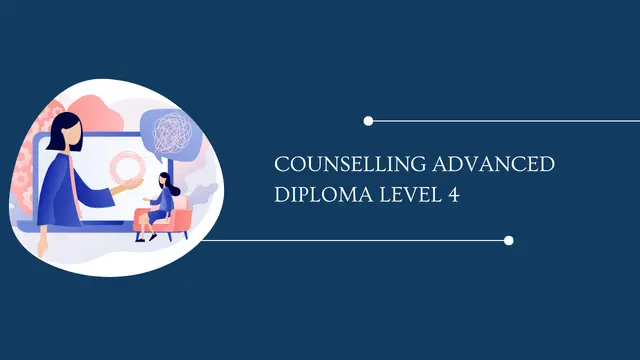
Counselling Advanced Diploma Level 4
Online Learning College
Summary
- Counselling Advanced Diploma Level 4 - Free
- TOTUM card available but not included in price What's this?
Add to basket or enquire
Overview
This Counselling Advanced course will teach you various approaches to counselling. These will include Existentialist, Rational Emotive and Adlerian therapies plus more. Counselling is a sort of ‘talking therapy’ that allows an individual to talk about their problems and feelings in a confidential environment. Sometimes the term “counselling” is used to refer to talking therapies in general, but counselling is a type of therapy in its own right.
Certificates
Counselling Advanced Diploma Level 4
Hard copy certificate - Included
Certificate of completion.
Description
About this course
In 2014 the BACP carried out some research to find out more about people’s attitudes towards counselling and psychotherapy. Some of the key findings included:
- 28% of people have consulted a counsellor or psychotherapist (up from 21% in 2010)
- 54% of respondents said that they, a family member, friend or work colleague have consulted a counsellor or psychotherapist
- 69% of people think the world would be a better place if people talked about their feelings more.
You will learn the distinctive differences and similarities between the approaches. These techniques are not universal and vary from topic to topic.
Study time 100 hours
Enrollment length 12 months
Course format Paper or online
Entry requirements None specific
Course content
Module 1: Counselling – Definition, Qualification & Registration
Module 2: Freud and the Psychoanalytic Approach
Module 3: Jung and the Development of the Psychodynamic Approach
Module 4: The Adlerian Approach & Individual Psychology
Module 5: Existential Psychotherapy
Module 6: Gestalt Psychotherapy
Module 7: Psychodrama Therapy
Module 8: Carl Rogers & Client Centred Counselling
Module 9: Transactional Analysis
Module 10: Neuro-Linguistic Programming
Module 11: Egan and the Skilled Helper Approach
Module 12: Albert Ellis and the Rational Emotive Behavioural Approach
Module 13: Beck and the Cognitive Behavioural Therapy Approach
Module 14: Reality Therapy
Module 15: Post Traumatic Stress Counselling
Module 16: Verbal Communication Skills in Counselling
Module 17: Non Verbal Communication
Module 18: Counsellor/Client Listening Skills
Module 19: Counselling and the Law
Module 20: Counselling & Administrative Considerations
Who is this course for?
This course is a great progression course from Counselling Level 3.
Requirements
No entry requirements.
Questions and answers
Currently there are no Q&As for this course. Be the first to ask a question.
Reviews
Currently there are no reviews for this course. Be the first to leave a review.
Legal information
This course is advertised on reed.co.uk by the Course Provider, whose terms and conditions apply. Purchases are made directly from the Course Provider, and as such, content and materials are supplied by the Course Provider directly. Reed is acting as agent and not reseller in relation to this course. Reed's only responsibility is to facilitate your payment for the course. It is your responsibility to review and agree to the Course Provider's terms and conditions and satisfy yourself as to the suitability of the course you intend to purchase. Reed will not have any responsibility for the content of the course and/or associated materials.


